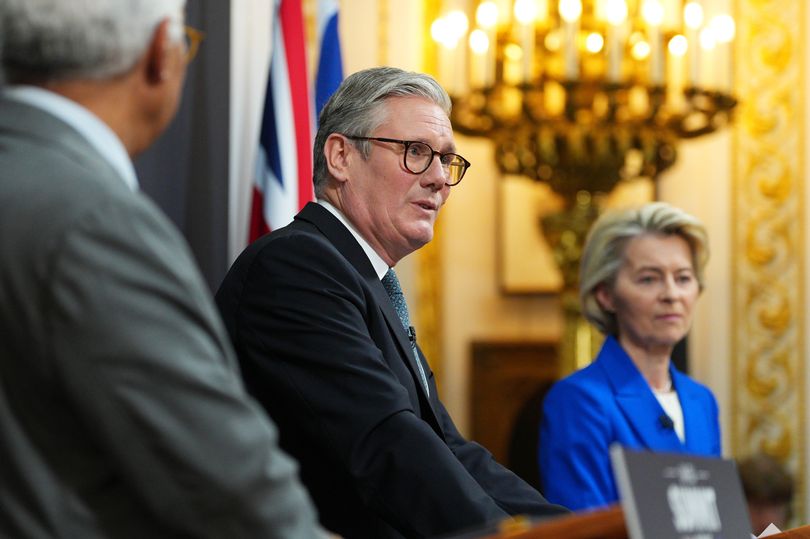Keir Starmer has unveiled a new blueprint for UK-EU relations, promising to cut through the red tape for businesses and holidaymakers as he aims to leave the “stale old” Brexit debates behind.
More than four years after Boris Johnson’s initial trade agreement, Mr Starmer set out his post-Brexit vision at a summit in London, following talks on issues including defence, fishing rights, and food exports.
Is Starmer’s EU deal a turning point for the UK post-Brexit or will we become ‘rule-takers from Brussels’? Have your say in our comments section.
READ MORE: DWP confirms people born in these years will avoid tough PIP changes
READ MORE: £200 payments announced for state pensioners who’ve lost Winter Fuel Allowance
The proposed arrangement promises smoother travel for tourists with expanded access to e-gates at European airports, potentially easing the lengthy queues seen at passport control. Businesses are expected to see a reduction in bureaucratic hurdles, which Downing Street believes could lead to lower consumer prices and boost the economy by nearly £9 billion by 2040.
Pet owners across the UK will also have something to celebrate as the deal includes provisions for pet passports, allowing cats and dogs easier travel. Additionally, the agreement reopens doors for British businesses to export burgers and sausages to the EU.
A mutual understanding has been forged, ensuring 12 years of continued fishing access for EU vessels in British waters, and vice versa.
At the summit, Mr Starmer celebrated Britain’s resurgence on the global scene, heralding recent trade agreements with nations like India and the US as key to driving job creation and economic growth in the UK, according to a report by the Mirror.
The PM stated: “It’s time to look forward. It’s time to move on from the stale old debates and political fights to focus on delivering common sense, practical solutions which get the best for the British people. We’re ready to work with all our partners wherever it means we can improve people’s lives here at home.”
He further detailed that, “That’s what this deal is all about – facing out to the world once again, in the great tradition of this nation. Building the relationships we choose, with the partners we choose, and closing deals in the national interest.”
Current fishing access and quotas are understood to remain unchanged for coastal communities and both British and EU vessels. It is believed that Brussels has conceded on its demand to correlate the length of a deal concerning food and agricultural goods with fishing rights.
Brexit pressures have flared anew amid these fishing industry updates. Tory leader Kemi Badenoch lambasted the latest development, asserting “we’re becoming a rule-taker from Brussels once again” and Nigel Farage condemned it as “abject surrender”.
In a bid to buoy British fishing and coastal communities, the Government has unveiled a hefty £360 million boost via the new Fishing and Coastal Growth Fund.
Yet Elspeth Macdonald, the Scottish Fishermen’s Federation (SFF) chief executive, was scathing about the deal: “This deal is a horror show for Scottish fishermen, far worse than Boris Johnson’s botched Brexit agreement. It is clear that Sir Keir Starmer made the whole deal on the backs of our fishermen and coastal communities, granting EU vessels 12 years of continuous access to UK waters at the last minute in order secure other objectives.”
Marine conservation charity Open Seas’ Phil Taylor also voiced his concerns amid the row over fishing entitlements, noting an essential yet frequently ignored aspect: “The debate about the length of the fishing deal and the amount of access granted to EU boats is missing a key point, since some of the biggest UK fishing companies are EU owned, while a number of Scottish boats are still landing more than half their catch directly to the continent.”
He called for holistic legislative foresight: “The question politicians need to resolve is how this deal will actually deliver for our seas, and what conditions will be put on any fishing businesses accessing the public resource that is the sea – regardless of where they are from.”
Is Starmer’s EU deal a turning point for the UK post-Brexit or will we become ‘rule-takers from Brussels’? Have your say in our comments section.
